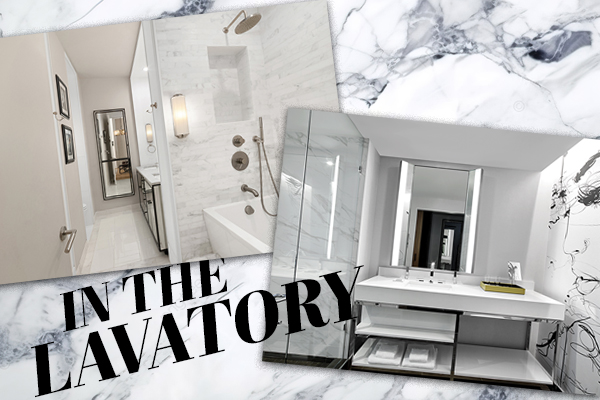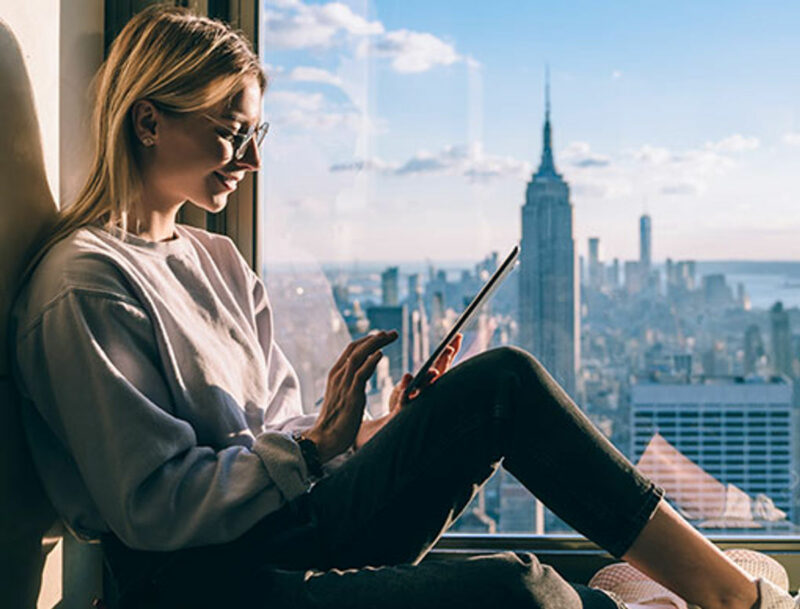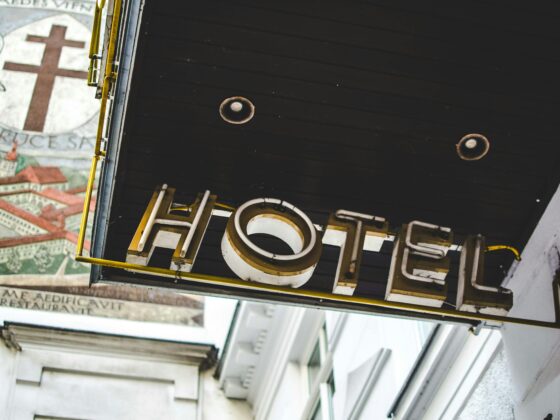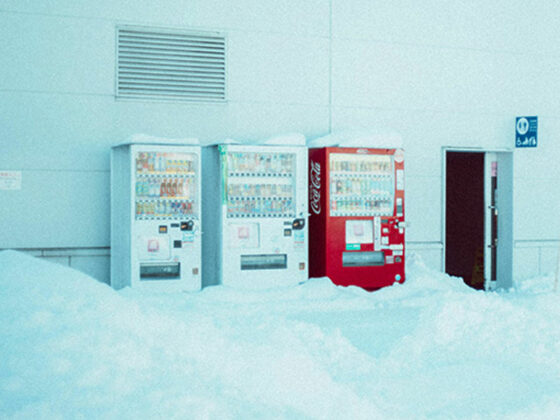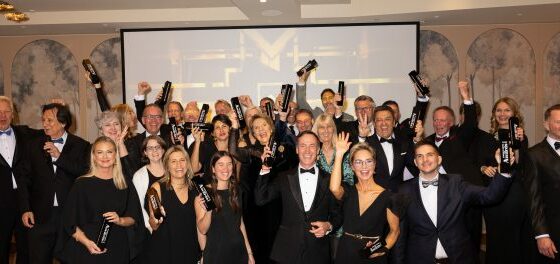There are few elements of a hotel that can elicit as good of a ’wow’ response as the bathroom, if done right. In fact, a well-designed, well-working bathroom is an essential part of the guest experience and one that can’t be overlooked, but, rather, focused on.
“Hotels that cater to the luxury market are designed to provide an intended stay experience to guests,” said Alexander Zilberman, founder and principal architect at Alexander Zilberman Architecture. “The bathroom must be a continuation of that experience—this is an essential element. The bathroom is part of the story the hotel operator is telling.”
A Zilberman hallmark integrates the bathroom into the room, rather than making it separate. Besides a strong, well-placed vanity, he favors additional privacy for the commode— partitions or screens if not actual walls—and always a walk-in shower, which needs both good plumbing infrastructure and a quality shower head. But integrating functional components with the overall experience is tricky.
“It’s hard to design something that feels bespoke and unique while also being repeatable in construction,” said Zilberman, who recommends using modules from the manufacturer or fabricator to experiment with as parameters. “The layout ultimately emerges from an integrated design process that bears those proportions and modules in mind.”
Designing bathrooms isn’t all austere utility; there is room for, and even need, to evoke a sense of wonderment, joy and surprise. “There was a hotel in Milan where the bathroom completely ’wowed’ me—every surface, from floor to ceiling and in between, was entirely clad in satin-finish brass,” Zilberman said. “Several functioning elements were concealed behind brass panels, with the commode behind a brass door with no hardware. Such a bathroom design requires rigor and commitment—and ultimately was so memorable for us.”
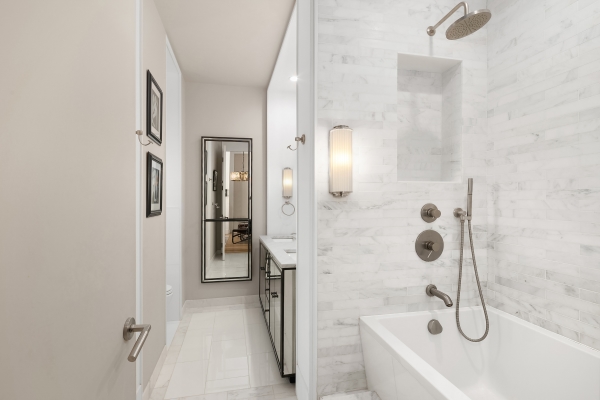
POLISHED PERSONAL SPACE
“Bathrooms are a very important part of any hotel, as it is where the guest spends much of their time,” said architect and designer Lauren Rottet, founding principal and president of Rottet Studio. “A good bathroom experience translates to a good hotel experience.”
They are also, Rottet pointed out, an important part of a hotel’s budget. Through the cost of waterproofing, plumbing, electrical, fixtures and more, it’s one of a property’s costliest aspects. But Rottet is not one to skimp on details, either— especially lighting. Indeed, hotel operators often tell her that “guests remark on how well-lit our bathrooms are,” she said.
Her projects are lit through backlit mirrors, flush-mounted ceiling lights or strategically placed sconces and downlights behind the head. Windows are an added luxury, but require a way to block out light, too.
In one project, The St. Regis Aspen Resort, French doors were incorporated on the bedroom side of the soaking tub, opening the view to the Aspen mountains. “In others, Rottet said, “we’ve placed a strategic window between two mirrors above the vanity, or a glass wall between the shower and the bedroom.”
Equally important is how well guests can maneuver around. Rottet Studio designs vanities intended for two people, with counter space for two toiletry bags, as many drawers as possible—including a separate one to conceal the hairdryer—and shelves beneath for glasses and towels, often bordered by medicine cabinet[1]sized wall niches to store the cosmetic products.
And while matching the overall aesthetics of the hotel is not “not a challenge, but a must,” it’s important to vary the materials. “We do not use the same material in the bathroom that we use elsewhere,” she said. “No one likes to see the same stone on their dining table as on their bathroom floor.”
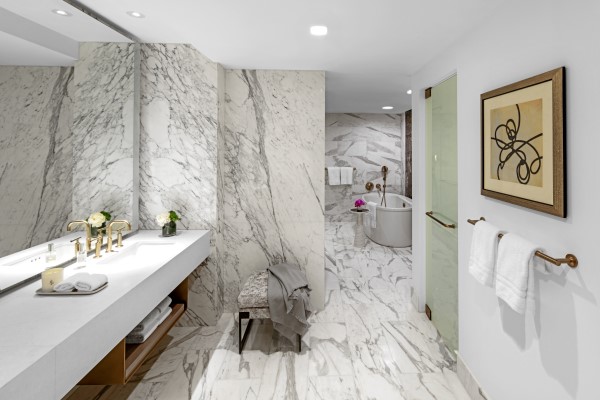
COMMODE CONFIGURATION
“Having the proper layout is critical, though what’s possible depends on the type and price point of the hotel,” said Brent Zeigler, president of design firm Dyer Brown & Associates, whose work includes The Langham, Boston and Studio Allston Hotel, also in Boston. “Often in single-user bathrooms, the access space for all three fixtures—shower, sink, toilet—overlap each other. While this is not the most pleasing layout, it tends to be the most efficient.”
Zeigler recommends positioning the toilet along the same wall as the sink and vanity, opposite the shower. Sliding doors add more space, but hinged doors are more secure, are better for reducing noise and improve privacy. But moving the vanity requires moving the light, which is its own challenge. “We’ve worked on hotels where the bathroom gets natural light, which is great when it happens, but can lead to privacy issues,” said Zeigler. Solutions include opening the vanity-sink space to the room, separating rooms with a translucent glass partition or even full-height sliding shutters.
PRODUCTS WITH PERSONALITY
“Our primary mission is to inspire guests and create a memorable sensory experience,” said Laurent Marchand, CEO of Groupe GM, a provider of hotel amenities. “We dedicate significant care and effort to developing products that evoke dreams and sophistication.” Cosmetic amenities have storytelling capabilities, just like the bathrooms they inhabit. Groupe GM develops hotel product lines through collaborations with licensed brands and by crafting bespoke solutions tailored for hotels to directly match the property’s personality.
Through a collaboration with the cosmetic brand Typology, Groupe GM is expanding its brand portfolio and reaching a broader international audience than ever. Known for their clean formulas and eco-friendly packaging, the new Typology hotel line features PEG-free and sulfate-free formulas.
“This line not only reflects the core values of our companies but also aligns with our ’Care About Earth’ initiative, emphasizing eco[1]responsibility,” Marchand said. “This partnership allows us to offer luxurious amenities that are environmentally conscious, enhancing guest satisfaction while contributing to sustainability efforts globally.”
Groupe GM has made sustainability a core pillar of its business approach, and its Care About Earth program has led to the creation of renewable product solutions, like packaging materials out of bio-sourced plastic made from sugarcane and recycled aluminum. “This integration of luxury and sustainability distinctly sets our hotel product lines apart from more traditional offerings,” Marchand said.
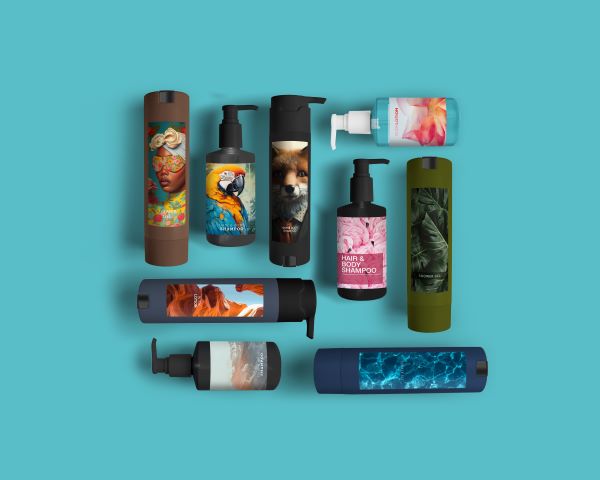
OLFACTORY SATISFACTION
“Each hotel has its own style, to which a particular brand of hotel cosmetics is suited,” said Hans Vriens, ADA Cosmetics’ managing director and president of North America. “The decision should not be based purely on economic considerations. Our customers confirm that the value of cosmetic products perceived by hotel guests as high quality is enormous compared to the actual cost. They have a huge impact on the hotel guest’s sense of well-being.”
For most hotels, brand choices depend on several criteria—scent and guest experience, hygiene, sustainability—but housekeeping efficiency is a critical aspect. ADA Cosmetics recently unveiled a refill machine to help hotels reduce product and plastic waste while increasing efficiency. For every liquid amenity, ADA Cosmetics provides a refill machine that can refill dispensers in seconds without spillage, avoiding waste and contamination. The refill machines come with refill trays and trolleys to store and move dispensers effortlessly.
It’s a welcome development for an aspect of hospitality that is both costly and time-consuming. “In our experience, you can expect about 10 liters of liquid per room per year,” said Vriens. “So, if shampoo and shower gel are used in every room, that is 20 liters per year, per room. For a hotel with 100 rooms, that is about 20 liters of liquid per week.”
If a property is looking to refill or change its collection of amenity products, through the ADA Cosmetics Atelier they can design products with their preferred fragrance, design and dispenser system. This tool enables the configuration of a bespoke cosmetics line to complement a hotel’s brand identity. The new service covers an array of products, including shampoo, conditioner, shower gel and body lotion.
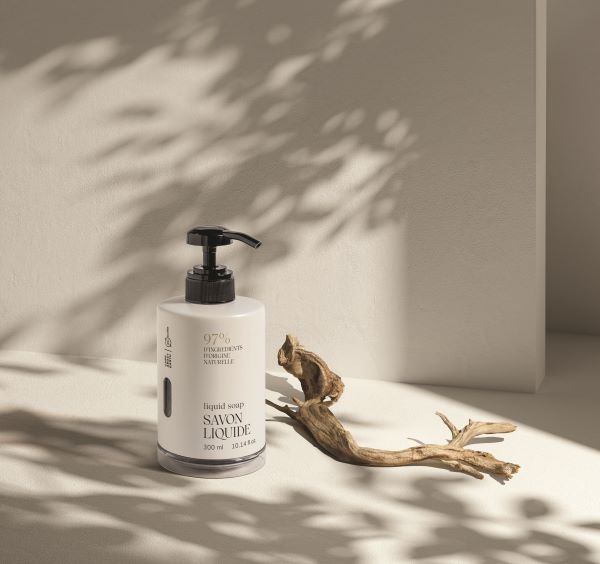
ENGINEERED AMENITIES
“It used to be guests wanted the same [products] as they had at home,” said Dave Rutherford, senior director of sales at personal care product manufacturer Conair Hospitality. “Now, they want better than at home.” In the old days, hotels stocked their bathrooms with off-the-shelf products, putting operators on the hook if something should break or go missing. These days, Conair Hospitality offers coffeemakers, mirrors, scales and more, in addition to its ubiquitous hairdryers.
Properties can order products in uniform quantities, safe in the knowledge that everything has been designed for rough, repeated use.
New in 2024 is the Conair “Turbo ExtremeSteam,” a handheld steamer-iron combo with a built-in sensor that pauses steaming when placed on a flat surface and starts again when upright. The company also unveiled “Stay by Cuisinart,” a line of in-room kitchen appliances, such as toasters, blenders and coffeemakers with one-button operation and built-in safety systems like an automatic shutoff.
Despite Conair Hospitality’s best efforts to make their product as hazard-free as possible, from automated shutdowns to flame-retardant material, their products are often tested by unscrupulous guests in ways not even the most seasoned engineer could envision. “You do your best,” said Rutherford. “But you can’t out-engineer stupid.”
Story contributed by Derek Herscovici.
